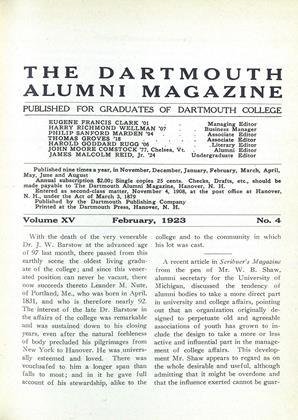"The Social Philosophy of Instinct" by Charles Conant Josey. pp 274. Charles Scribner's Sons, 1922.
The general purpose of this volume is to discuss the role and function of instinct in social life and conduct. Its particular aim is to prove that religion, popular philosophy, and science tend to justify an activity merely as the expression of an instinct, with only a secondary regard for its social results and consequences. This thesis is thus stated in the words of the author: " writers from the evolutionary point of view have placed great emphasis on the necessity or advisability of allowing the innate tendencies, or instincts, free and unimpeded expression. It is only in this way, many tell us, that we can hope to realize that well-developed and complete life for which we have been so admirably suited by the supply of instincts and capacities'which the evolutionary process has given us. Thus, religion, popular philosophy, and science have united to throw around the instinctive, a sanction which gives justification to any activity-provided it is an expression of an instinct.
"It is this tendency to evaluate an activity as an expression of an instinct, rather than in terms of its consequences, that causes the use of instinct as a sanction to share the evils found in all categorical imperatives or commands that are obeyed irrespective of their consequences. In addition to the evil that is common to all sanctions, the use of instinct as a sanction is especially undesirable, for instead of being an expression of what may be regarded as the highest moral feelings of the age, the use of instinct is too often a mere exalting of characters that are common to man and the higher animals." (p. 246).
While it is undoubtedly true that there are writers who place an unwarranted emphasis on the expression of instinct as the fulfillment of the good life, in the field of economics and sociology it is open to question whether this group which justifies the expression of instinct as such is an increasing one or is significant in numbers or influence at the present time. Some of the present-day economists and sociologists who have emphasized the importance of instinctive expression have had clearly in mind the results of such expression as a standard of approval or disapproval. R. H. Tawney makes this clear in his work "The Acquisitive Society." Bertrand Russell, in "Principles of Social Reconstruction," has . pointed out that instinctive expression can be evil as well as beneficial socially. And other writers in the realm of the social sciences recognize that instinct has no sanction apart from desirable social results.
Aside from the question of sanction attached to instinct, a genuine service is performed by any author who points out — as this author does point out — the futility of studying the role and function of instinct in its social implications without relating to it at the same time the environment which gives rise to instinctive responses. The environment and the instinctive reactions produced by it must be studied together if we are to secure any clear ideas of human nature and conduct. From the standpoint of social conduct, to analyze and classify the instincts, and to attempt to interpret them significantly in an abstract way is very much like trying to study the reactions of a living fish by removing it from the water. When we study the environment and the instinctive responses it produces together, then, from the standpoint of behavior, instinct begins to assume a position secondary to habit, custom, and social values, much confusion of thought disappears, and the way is Open for us to secure a social order which is in accord with the highest moral standards and preferred social ideals of our time.
No attempt has been made in this review to criticise from the viewpoint of psychology as such the psychological theories and premises involved in the book. To determine how well the author has maintained his position in this respect any one would have to examine the book itself.
Ernst Antevs is the author of "The Recession of the Last Ice Sheet in New England," published by the American Geographical Society as "Research Series No. 11." This volume contains a preface and contributions by Prof. J. W. Goldthwait.
Prof. J. W. Goldthwait is also the author of a most interesting and helpful article in the January issue of The Open Road entitled "Learning to Ski."
The issue of the Transcript for December 20 contains a short article "Sounds Speak ofDays Long Gone" by Eric P. Kelly '06.
The Outing Club's Stadium
 View Full Issue
View Full Issue
More From This Issue
-
 Article
ArticleWith the death of the very venerable
February 1923 -
 Article
ArticleCUTHBERT'S DIARY
February 1923 By EDWIN JULIUS BARTLETT '72 -
 Article
ArticleFRANK SHERWIN STREETER
February 1923 -
 Sports
SportsBASKETBALL
February 1923 -
 Article
ArticleWHY DARTMOUTH?
February 1923 By E. GORDON BILL -
 Class Notes
Class NotesCLASS OF 1911
February 1923 By Nathaniel G., Martha Flagg Emerson, WARREN F. KIMBALL
Books
-
 Books
BooksAlumni Articles
MARCH 1969 -
 Books
BooksAn Algebra Among Cats
October 1975 By J.H. -
 Books
BooksLANDMARKS: A BOOK OF SONNETS AND OTHER POEMS.
October 1954 By JOHN HURD '21 -
 Books
BooksALFRED LORD TENNYSON: IN MEMORIAM. AN AUTHORITATIVE TEXT, BACKGROUND AND SOURCES, CRITICISM.
May 1974 By JOHN HURD'21 -
 Books
BooksTHE COLLECTION OF FEDERAL OLD-AGE BENEFITS TAXES AND THE RECORDING OF WAGES BY MEANS OF THE STAMP PASS BOOK SYSTEM.
December 1936 By Lloyd P. Rice -
 Books
BooksHOSPITAL POLICY DECISIONS PROCESS AND ACTION.
JUNE 1966 By WILLIAM L. WILSON '34


